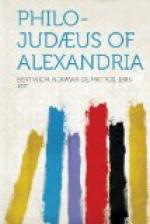* * * * *
II
THE LIFE AND TIMES OF PHILO
“The hero,” says Carlyle, “can be poet, prophet, king, priest, or what you will, according to the kind of world he finds himself born into."[39] The Jews have not been a great political people, but their excellence has been a peculiar spiritual development: and therefore most of their heroes have been men of thought rather than action, writers rather than statesmen, men whose influence has been greater on posterity than upon their own generation. Of Philo’s life we know one incident in very full detail, the rest we can only reconstruct from stray hints in his writings, and a few short notices of the commentators. From that incident also, which we know to have taken place in the year 40 C.E., we can fix the general chronology of his life and works. He speaks of himself as an old man in relating it, so that his birth may be safely placed at about 20 B.C.E. The first part of his life therefore was passed during the tranquil era in which Augustus and Tiberius were reorganizing the Roman Empire after a half-century of war; but he was fated to see more troublesome times for his people, when the emperor Gaius, for a miserable eight years, harassed the world with his mad escapades. In the riots which ensued upon the attempt to deprive the Jews of their religious freedom his brother the alabarch was imprisoned;[40] and he himself was called upon to champion the Alexandrian community in its hour of need. Although the ascent of the stupid but




